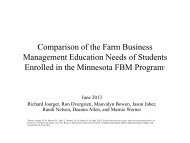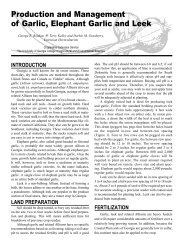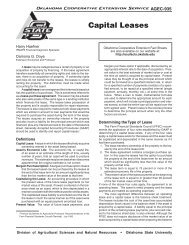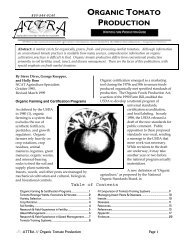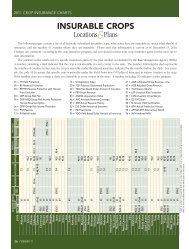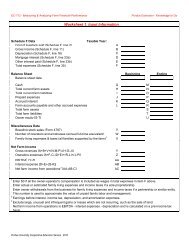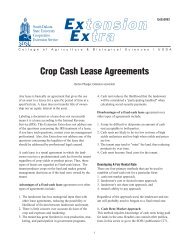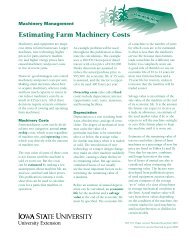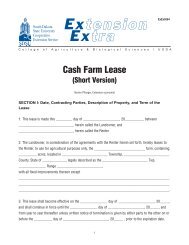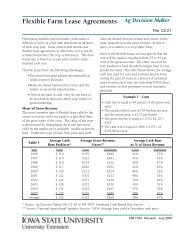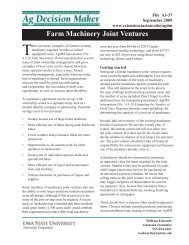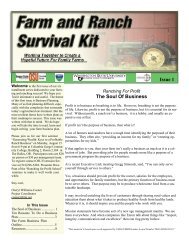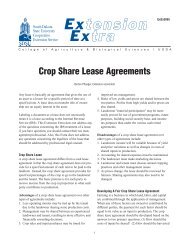Conflict Management Styles - National Ag Risk Education Library
Conflict Management Styles - National Ag Risk Education Library
Conflict Management Styles - National Ag Risk Education Library
You also want an ePaper? Increase the reach of your titles
YUMPU automatically turns print PDFs into web optimized ePapers that Google loves.
<strong>Conflict</strong>-<strong>Management</strong> Style<br />
In this section you will have the opportunity to examine your own conflict-management<br />
style and techniques you tend to use in conflict situations, particularly under stress. The<br />
exercises that follow will enable you to gain insight in to strategies you might choose to<br />
incorporate into your behavior in handling disputes and differences.<br />
<strong>Conflict</strong>-<strong>Management</strong> Style Survey*<br />
This <strong>Conflict</strong>-<strong>Management</strong> Style Survey has been designed to help you become more<br />
aware of your characteristic approach, or style, in managing conflict. In completing this survey,<br />
you are invited to respond by making choices that correspond with you typical behavior or<br />
attitudes in conflict situations.<br />
Section 1: Survey<br />
This survey identifies twelve situations that you are likely to encounter in your personal<br />
and professional lives. Please study each situation and the five possible behavioral responses or<br />
attitudes carefully and then allocate ten points between them to indicate your typical behavior,<br />
with the highest number of points indicating you strongest choice. Any response can be<br />
answered with from zero to ten points, as long as all five responses for a given situation add up<br />
to ten points, as shown in the following example:<br />
EXAMPLE SITUATION: In responding to a request from another for help with a problem, you<br />
would:<br />
4 A. Clearly instruct him or her how to proceed.<br />
2 B. Enjoy the strategizing and the challenge.<br />
3 C. Help him or her take responsibility for the problem.<br />
1 D. Find it unnerving but agree to help.<br />
0 E. Avoid the invitation at all costs.<br />
10 TOTAL<br />
Please choose a single frame of reference (e.g., work-related conflicts, family conflicts,<br />
social conflicts) and keep that frame of reference in mind when responding to all the situations.<br />
And remember, as you complete this survey, that it is not a test. There are no right or wrong<br />
responses. They survey will be helpful to you only to the extent that your responses accurately<br />
represent your characteristic behavior or attitudes.<br />
SITUATION 1: Upon experiencing strong feelings in a conflict situation, you would:<br />
_____ A. Enjoy the emotional release and sense of exhilaration and accomplishment.<br />
_____ B. Enjoy the strategizing involved and the challenge of the conflict.<br />
_____ C. Become serious about how others are feeling and thinking.<br />
_____ D. Find it frightening because you do not accept that differences can be<br />
discussed without someone’s getting hurt.<br />
_____ E. Become convinced that there is nothing you can do to resolve the issue.<br />
TOTAL<br />
*Based on Jay Hall’s <strong>Conflict</strong> <strong>Management</strong> Survey: A Survey of One’s Characteristic Reaction to and Handling of <strong>Conflict</strong> Between Himself and<br />
Others (The Woodlands, Texas: Telemetrics International 1969)><br />
The Leadership Center At Washington State University<br />
D:\My Documents\Websites\lead\library\resources\RESOURCES\<strong>Conflict</strong> Resolution\<strong>Conflict</strong>-<strong>Management</strong> Style.doc<br />
1



